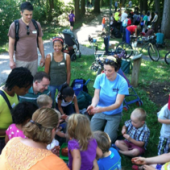
This article briefly summarizes a body of research in which love is understood to be at the core of three primary life experiences that foster life-long care for the environment: time in nature, especially during childhood; close role models for care of nature; and participation in an organization that fosters direct learning about nature. From this foundation, family nature clubs are presented as having a fairly unique capacity to offer all of these experiences. The family nature club founded by the author, Columbia Families in Nature, is described in some detail, including photos and quotes from the participants and summary results from research on the broad effects of family nature clubs is presented. All together, the case is made that family nature clubs are a ripe opportunity for communities to cultivate connection, care, and love between people and the natural world.
Continue Reading
Interviews with undergraduate students were conducted as part of a follow-up to a survey soliciting information about student engagement in sustainability at a small upper Grea.t Lakes public university. The environmental psychology theoretical foundation for the study presented the potential interdependent role of social and physical conditions to support environmental behavior change. Twelve undergraduate students were interviewed with a goal of gaining additional insight into daily student engagement in sustainability. Hycner’s (1985) guidelines were used for the phenomenological analysis of the interview data. Data were recorded, transcribed, and analyzed. The key finding was an affirmation of the idea that we must identify and eliminate barriers in order to support an increase in daily student participation in sustainability. Participants noted convenience as a key factor to consider. Numerous references to “back home” remind us that we need to make our campus function more like a community with systems that support engagement. Reflective analysis of all of the findings leads to a discussion of how this particular university can achieve the intent of its core value of sustainability. It is proposed that this university put more energy into changing norms than changing attitudes. Heberlein’s (2012) behavior change guidelines are used to provide a strategy for addressing behavior change via an emphasis on normative behavior. Facilitating sustainability actions as normative behavior may be an effective first step in long-term attitudinal change.
Continue Reading